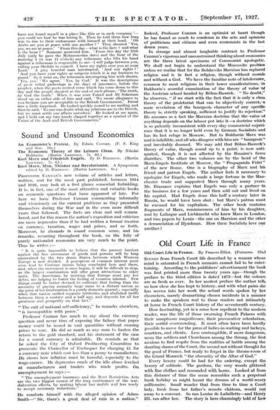Sound . and Unsound Economics - The Economic Theory of the
Leisure Class. By Nikolai
Bukharin. (Martin Lawrence. 7s. 6d.) _
Karl Marx and Friedrich Engels. By D. Riazanov. (Martin -Lawrence. 7s. 6d.) Karl Marx, Man, Thinker and Revolutionist.' A Sympoifium PROFESSOR CANNAN'S new volume of articles and letters,
written, and for the most part published, between • 1914 'and 1926, may look at a first glance somewhat forbidding.
It is, in fact, one of the most attractive and valuable books on economic -questions that have appeared of late. For 'here we have Professor Cannan commenting informally and vivaciously on the current problems as they presented themselves during the War and in the even more difficult years that followed. The facts are clear and well remem bered, and for this reason the author's exposition and criticism are more impressive than if he had written a formal treatise on 'currency, taxation, wages and prices, and • so forth. 'Moreover, he abounds in sound common sense, and his reniarks, recurring throughout the book, on the folly of purely nationalist economic.s are very much to the point.
Thus he writes :— -. •
" It is quite impossible to believe that the pregent barrier's against the free movement of goods and -persons will be' long maintained by the two dozen States, between which Western Europe is now divided. A perception of common interest must soon lead to Customs unions being Concluded here and there, and, when the movement is once begun, it will be difficult to stop, as the largest combination will offer great attractions to other units. The Ameripans, by insisting that Europe must pay her debts, am helping to foster the feeling of common interest. Few things could be better devised to cultivate that feeling than the necessity -of paying annually large sums to a distant nation as the price of her intervention in a purely domestic quarrel ; especially when that nation unified separate territories and abolished tariffs between them a century and a half ago, and depends for all her greatness and prosperity on that fact."
"The cult of national self-sufficiency," he remarks elsewhere, "is incompatible with peace."
Professor Carman has much to say about the currency . .
question and never tires of exposing the fallacy that paper money could be issued in vast quantities without causing prices to soar. He did as much as any man to hasten the return to the gold standard, and his statement of the case for a sound currency is admirable. He reminds us -that he asked the City of Oxford Profiteering Committee to prosecute the Chancellor of Exchequer for charging 11 for
a currency note which cost less than a penny to manufacture. He shows how inflation must be harmful, especially to the wage-earner. lie deprecates much of the idle abuse levelled at manufacturers and . traders who made profits. On unemployment he says :— 'The unemployment insurance and tho Rent Restriction Acts' are the two biggest cauSeS of the long continuance of the war; dislocation effects, by making labour less Mobile add less ready
.
to a _ _ ceetit necessary reductions." .
He comforts himself with -the alleged ()Pinion Of Adam Smith—" Sir, there's a great deal of ruin in a potion.",
Indeed, Professor Cannan is - an optimist - at heart though he has found so much to condemn in the acts and opinions of politicians and citizens and even economists in the' last dozen years.
In strange and almost laughable contrast • to Professor Cannan's vigorous and unconstrained thinking about economics are the three latest specimens of Communist 'apologetic. We shall not begin to understand the • Muscovite position unless we realize that for the Bolsheviks Marxism has replaced religion and is in fact a religion, though without morals and without a God. We have the familiar note of intoletanre, common to most religions in their lower manifestations, in Bukharin's scornful examination of- the theory of 'value "of the Austrian school headed by Bohm-Bawerk. "No doubt," he observes, "if-we start with the fact that it'is • only 'a class theory of the -proletariat that can be 'Objectively corteet), mete revelation of the bourgeois character of any spallie theory is, strictly speaking, sufficient to justify its rejection'," He assumes as-a fact the-Marxian doctrine that the-value-of anything depends-on the labour put into it—a doctrine-Whieh is so patently inconsistent with every-clay cominereiaL exPlgri- ence that it is no longer held even by German Socialists:and has its last refuge in Moscow. But to Buldiarin- Marx- was and is-infallible, and all who disagree with him are " bourgeois'' and inevitably doomed. We may add that Bohm-Bawerk's theory of value, though sound up to a point; is-riow • anti- quated, though it is- not affected by the 'Russian's fierce diatribes. The other two volumes are by the -head of the Marx-Engels Institute- at Moscow, the "Propaganda Fidel" of the new Rome. One is a biography of Marx and friend and patron Engels. The author feels it necessary-to apologize -for Engels, who made n large fortune in -the -Man- chester trade and supported Marx through many years. Mr. Riazanov explains that Engels was only a partner An the business for a few years and then sold -out and lived -on his capital. Had Engels done this half 'a century later in Russia, he would have been shot ; but Marx's patron mukt be excused for his capitalism. The other book Contains fragments of Marx, reminiscences of him by- his daughter, and by Lafargue and Liebknecht who knew Marx in London, and two papers by Lenin—the one on Marxism and the other a denunciation of Hyndman. How these Socialists love one another 1














































 Previous page
Previous page